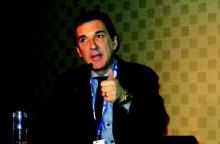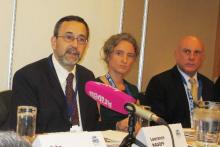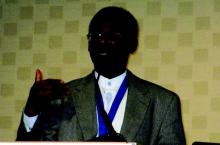VIENNA – The world had better get used to dealing with Ebola virus outbreaks, because even if the west African outbreak comes under control others will inevitably follow until an effective vaccine becomes widely used.
On top of that, experts who gathered at the International Meeting on Emerging Disease and Surveillance said that they saw no quick end to the current west African outbreak.
“At this point, Ebola is so entrenched in west Africa that it will come back again. It is basically part of the [west African] ecology,” Dr. Adriano G. Duse said in an interview. He also painted a pessimistic picture of short-term prospects for controlling the current outbreak.
“It will be around [in west Africa] for at least the next year. There is no sign of it abating,” said Dr. Duse, professor and head of the department of clinical microbiology and infectious diseases at the University of Witwatersrand in Johannesburg, South Africa, and a specialist in viral hemorrhagic fevers. “We suspect that the [Ebola] virus has been around in west Africa for a long time, and it was just a matter of time until it went into people.” He noted that the Ebola species currently circulating in west Africa closely matches the Zaire strain that was the type that first surfaced in people in 1976.
“We are now so high in numbers in west Africa that it will take months” to control the current outbreak, agreed Dr. Hilde de Clerck, a family physician who serves as a mobile implementation officer for viral hemorrhagic fevers for Médicins Sans Frontières (MSF; Doctors Without Borders), who began working last March in Guinea on patient care and infection control. “At MSF, we are planning that it will take at least 6-12 months, but that is a guess; we have no clue” how long the current outbreak will continue, Dr. de Clerck said in an interview. “At this time, we are running behind.”
On Nov. 14, the World Health Organization (WHO) pegged the number of Ebola virus infections known to have occurred in Guinea, Sierra Leone, and Liberia as of Nov. 11 at 14,383 (with a total of 14,413 total infection worldwide since the outbreak began), with 5,165 Ebola fatalities in west Africa and 5,177 worldwide. Dr. de Clerck, Dr. Duse, and others said that they believe that the WHO’s numbers greatly underestimate the true scope of the outbreak, even though the official numbers dwarf the size of all prior Ebola virus outbreaks since the virus first emerged in 1976; previous outbreaks always involved fewer than 1,000 infected people.
“The numbers we have seen show that the WHO’s numbers can’t be right,” Dr. de Clerck said.
Factors fueling Ebola’s spread
Dr. de Clerck attributed the unprecedented spread of Ebola during this outbreak to the high mobility of the people who live in the region where Guinea, Sierra Leone, and Liberia share borders. She described people in the region who routinely travel as much as several hundred kilometers from one day to the next, and the easy flow of traffic from one country to another. She also cited as a major factor in the virus’s spread the large funerals traditionally held by the people in the region that typically involve contact with the body of the deceased.
But perhaps most important in the outbreak’s spread was a slow initial response to the first cases in the region. Dr. Duse criticized the governments of the three affected countries for their lax response to the onset of the outbreak, while he also praised Nigeria for taking a dramatically different tack.
The initial response to Ebola in Guinea and its neighboring countries was “denial” and “apathy,” and the responses also “lacked funding,” Dr. Duse said at the meeting. “It would have come to an end much sooner if the response had been mobilized quicker.” In contrast, the Nigerian response “was exceptionally swift,” and serves as a “role model for how to approach” future Ebola outbreaks.
Oyewale Tomori, D.V.M., Ph.D., president of the Nigerian Academy of Science, called the approach of many African countries to Ebola as “an ocean of apathy, denial, and unpreparedness.” In Nigeria, an Ebola management center opened 3 days after an Ebola-infected person arrived at Lagos airport from Liberia on July 20. That one case led to the infection of 20 other people, but the chain of infection stopped there, helped no doubt by a physician strike at the time which meant the index case went to a private hospital instead of a public hospital.




